|
The Prague Spring had much impact on Latvia's cultural life. Long-awaited theater productions and films were shown in Latvia in 1967 and early 1968. These were dominated by heroes from a new generation who contrasted with the older, Stalin-era generation. Subtexts in poetry hinted at the enslavement of Latvians and Russia's centuries-long imperialistic aspirations in the Baltic region.
This budding journalistic freedom frightened the leadership of the Latvian Communist Party (LCP). A bureau meeting of the LCP Central Committee took place on March 26, 1968. In an effort to halt the free thinking, the bureau interrupted the run of Laimonis Purs' play To See the Sea (Redzēt jūru) and prohibited the showing of other plays and films. Author Alberts Bels was harshly criticized for his proposal to lift censorship.
The LCP often detected echoes of the events in Czechoslovakia in Latvian literary works. Thus Roberts Ķīsis, director of the LCP Central Committee Party Commission, deemed the 1969 collection of poetry Annual Rings (Gadu gredzeni) by Vizma Belševica to be based on the events in Czechoslovakia, even though her poems place the tragic situation of the Latvians in the distant past. Belševica was thereafter prohibited from publishing her works for several years.
But the existing powers were only able to offer ideology in the form of propagandists and mass media against the day-to-day speech of citizens. Even tourists from abroad had to be handled ideologically and treated to propaganda, although in 1968-1969 it was not possible to convince Czechoslovak tourists of the brotherly assistance given to them.
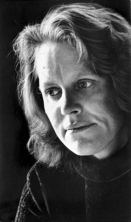
The poet Vizma Belševica (1931-2005) in the 1970s. In her poems Belševica voiced the feelings of Latvians under Soviet occupation and thus gained the mistrust of the authorities. After the release of her collection of poems Gadu gredzeni, Belševica was prohibited from publishing poetry and even translations for several years. She was a candidate for the Nobel Prize in Literature.
LVKFFDA, arh. nr. 85229N. Photo J. Krieviņš. |
...I write and from the words blood does
Not drip,
And the barbed bittreness of lefters does
Not gash the page.
You, Jesus Christ, over my shoulder read,
How Godfearingly for your fame I lie.
O Christ, your kingdom shall come over Us,
One god and tongue. And nation also one.
I see the Latvian land with crossnails Hammered
To the surface of your holy meekness.
Excerpt from Vizma Belševica's poem Indriķa Latvieša piezīmes uz Livonijas hronikas malām (The Notations of Henricus de Lettis in the Margins of the Livonian Chronicle) from the collection of poems Gadu gredzeni (Annual Rings). Riga, 1969. Translated by Baiba Kaugara.
|

Roberts Ķīsis' (chairman of the party commission of the Central Committee of the Latvian Communist Party) presentation in the debates at the June 11, 1969, general meeting of the Central Committee of the LCP about The elevation of the role of radio, television, the press, and the cinema in the communist education of the republic's workers:
Vizma Belševica's poems are an example of Aesop's language, in which words are chosen in order to lead the people from clear thinking into the fog of guessing. Let the people listen and guess...
This sorcery with the Livonian motif began in 1968, as the poet herself has admitted. We know that the battle between the socialist and bourgeois ideologies, between proletarian internationalism and bourgeois nationalism, intensified that same year. The events in Czechoslovakia aggravated this battle; counter-revolutionary laments filled the air and historical analogies were sought out to portray the bringing into Czechoslovakia of armed forces as a foreign invasion and a loss of Czech and Slovak freedom.
And our poet chooses precisely this time to take up the theme of the Livonian Chronicle. With past and future verbs she wrote her damnation of the foreigners.
LVA, PA-101. f., 33. apr., 4. l., 42. 43. lp. |
Roberts Ķīsis' (chairman of the party commission of the Central Committee of the Latvian Communist Party) presentation in the debates at the June 11, 1969, general meeting of the Central Committee of the LCP about The elevation of the role of radio, television, the press, and the cinema in the communist education of the republic's workers:
Vizma Belševica's poems are an example of Aesop's language, in which words are chosen in order to lead the people from clear thinking into the fog of guessing. Let the people listen and guess...
This sorcery with the Livonian motif began in 1968, as the poet herself has admitted. We know that the battle between the socialist and bourgeois ideologies, between proletarian internationalism and bourgeois nationalism, intensified that same year. The events in Czechoslovakia aggravated this battle; counter-revolutionary laments filled the air and historical analogies were sought out to portray the bringing into Czechoslovakia of armed forces as a foreign invasion and a loss of Czech and Slovak freedom.
And our poet chooses precisely this time to take up the theme of the Livonian Chronicle. With past and future verbs she wrote her damnation of the foreigners. |

Author Alberts Bels, who, inspired by the events in Czechoslovakia, proposed the lifting of censorship.
Latvia State Archive of Film, Photography and Audiovisual Documents, arh. nr. 46556N. Photo by I. Ozoliņš. |
Author Alberts Bels, who, inspired by the events in Czechoslovakia, proposed the lifting of censorship. |
Author Alberts Bels' speech at the December 9, 1968, writers' meeting, which was also attended by party employees:
During this complicated time, with tanks rolling from Moscow this past summer, I decided to take a risk and fly in an airplane to get here...
...People said that information is not available here. And truly writers have little information. Well, where could they find it? The press just keeps writing the same things over and over again, and anyway they are not objective. Today Dubček is described one way, but the next day he is described as the opposite...
...We have no institute that researches public thought. Well, such an institute does exist, but it works secretively. I'm talking about Avdjukēvičs' institute [i.e. the State Security Committee, or KGB]. But we [writers] do not receive their findings. I believe that the members of the party Central Committee do receive information from this institution, and they could share some of those with us. We - the writers - would be very thankful for that...
The issue of censorship. I believe that censorship is a very harmful institution. It is like serfdom for writers. ...I believe that the state will not fall apart if censorship were to be abolished in the Latvian republic 40 years before it was abolished in Russia, because serfdom was also abolished in Latvia 40 years before it was abolished in Russia.
|
| State Archives of Latvia, PA-101-33-47, pp. 49. 52. |
After Alberts Bels' courageous speech at the republic-wide writers' meeting attended also by party employees on December 9, 1968, the bureau of Central Committee of the Latvian Communist Party (LCP) decided on March 4, 1969:
1. to deem Bels' speech politically harmful and directed against the party leadership in literature and art;
2. to deem Bels politically immature and therefore not able to continue his studies in the script writers' and film directors' advanced courses offered by the USSR Council of Ministers Cinematography Committee,;
3. to officially reprimand Alberts Jansons, the first secretary of the Soviet Writers' Union and member of the CPSU since 1943, for failing to counter Bels' harmful speech at the republic-wide writers' meeting and for defending several ideologically harmful poems by Auziņš, Kaltiņa, and a few other poets.
|
| State Archives of Latvia PA-101-33-35, pp. 14 15. |

Alberts Jansons (first from right), the first secretary of the Soviet Writers' Union, conversing after a poetry reading by the Rainis Monument on September 10, 1968.
Museum of Literature, Theater, and Music (Latvia), nr. 96632. Photo by I. Kākulis. |
Alberts Jansons (first from right), the first secretary of the Soviet Writers' Union, conversing after a poetry reading by the Rainis Monument on September 10, 1968. |

The speech by author and member of the Latvian SSR Supreme Council Alberts Bels at the 4th meeting of the first session of the Latvian SSR Supreme Council on May 4, 1990:
...I call on the leadership of the USSR to cease holding nations by the hands, to quit strangling small nations, and to stop inciting people against each other! The country is in flames; the fire of ecological disaster is upon our doorstep. I urge the leadership of the USSR to do away with the last remnants of Stalin's tyranny. Don't bind us any tighter! Untie the knots! Let us free ourselves from the nightmares of injustice that still rule over our people! That is why we demand independence! God, grant us endurance!
http://www.saeima.lv/steno/AP_steno/1990/st_900504v.htm (10.05.2008)
|
The speech by author and member of the Latvian SSR Supreme Council Alberts Bels at the 4th meeting of the first session of the Latvian SSR Supreme Council on May 4, 1990:
...I call on the leadership of the USSR to cease holding nations by the hands, to quit strangling small nations, and to stop inciting people against each other! The country is in flames; the fire of ecological disaster is upon our doorstep. I urge the leadership of the USSR to do away with the last remnants of Stalin's tyranny. Don't bind us any tighter! Untie the knots! Let us free ourselves from the nightmares of injustice that still rule over our people! That is why we demand independence! God, grant us endurance!
|
Author Arvīds Grigulis' speech against Imants Auziņš' poem Pļi! [Fire!]1905 at the writers' meeting on December 9, 1968, which party employees also attended.
...This poem Pļi is about the year 1905, but in it the whole essence of 1905 is mixed up. Auziņš presents it as a battle between the Latvian and Russian people. But that has nothing to do with the facts. 1905 was a battle between the classes, when the Latvian proletariat fought against Czarism and the German barons...
But these poems are read in public, audiences applaud them, they are considered the pride of the nation, they poison our youth and make their lives difficult by showing them that some other nation is supposedly repressing their development...
|
| State Archives of Latvia PA-101-33-67, pp. 104 106. |
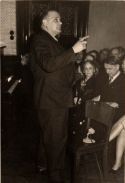
Arvīds Grigulis speaks at a writers' meeting in the 1960s.
Museum of Literature, Theater, and Music (Latvia), nr. 167218. |
Arvīds Grigulis speaks at a writers' meeting in the 1960s. |
We were rammed into the ground
by the Czar's shortest argument opinion of Russia:
Pļi! -
...
Pļi! Because the Baltics will forever
be a part of the Russian Empire...
Excerpt from Imants Auziņš' poem Pļi! [Fire!]1905. From the collection Skumjais optimisms, Riga, 1968. |
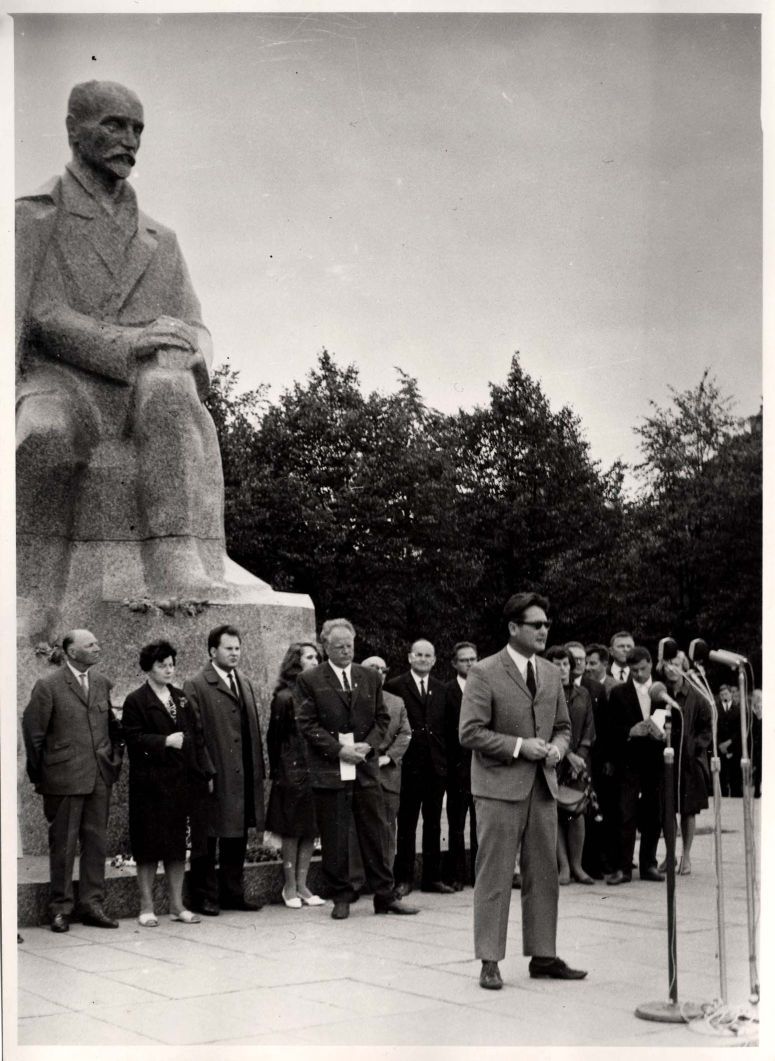
Poet Imants Auziņš, who angered the authorities with his poem Pļi!. Auziņš is seen here at a Poetry Days event by the Rainis Monument on September 10, 1968.
Museum of Literature, Theater, and Music (Latvia), nr. 95626. Photo I. Kākulis. |
Poet Imants Auziņš, who angered the authorities with his poem Pļi!. Auziņš is seen here at a Poetry Days event by the Rainis Monument on September 10, 1968. |
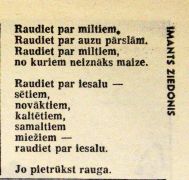
Author Arvīds Grigulis' speech against a poem by Imants Ziedonis published in the newspaper Padomju Jaunatne at the December 9, 1968, writers' meeting attended also by party employees:
While Voldemārs Krustiņš, the managing editor of the newspaper Padomju Jaunatne, was serving in the Soviet army and fulfilling his duties as a political civil servant in Czechoslovakia, the newspaper published the poem Raudiet par miltiem, raudiet par auzu pārslām, raudiet par iesalu, jo pietrūka rauga (Cry over the flour, cry over the oat flakes, cry over the malt, because there was no yeast). After the publication of the poem I had the opportunity to meet with some rural people, and I had a hard time explaining to them that this poem had nothing to do with the situation in Czechoslovakia and its evaluation. Because that's the way it is: there is yeast, but no bread or beer comes of it...
State Archives of Latvia PA-101-33-67, p. 102. |
Author Arvīds Grigulis' speech against a poem by Imants Ziedonis published in the newspaper Padomju Jaunatne at the December 9, 1968, writers' meeting attended also by party employees:
While Voldemārs Krustiņš, the managing editor of the newspaper Padomju Jaunatne, was serving in the Soviet army and fulfilling his duties as a political civil servant in Czechoslovakia, the newspaper published the poem Raudiet par miltiem, raudiet par auzu pārslām, raudiet par iesalu, jo pietrūka rauga (Cry over the flour, cry over the oat flakes, cry over the malt, because there was no yeast). After the publication of the poem I had the opportunity to meet with some rural people, and I had a hard time explaining to them that this poem had nothing to do with the situation in Czechoslovakia and its evaluation. Because that's the way it is: there is yeast, but no bread or beer comes of it...
|
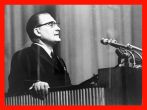
Augusts Voss, first secretary of the Central Committee of the Latvian Communist Party (LCP), delivering a speech in the late 1960s.
Latvia State Archive of Film, Photography and Audiovisual Documents, arh. nr. 62969N. |
The statement of LCP Central Committee first secretary Augusts Voss, meeting of the LCP Central Committee bureau at the March 26 1968:
I consider it to be good and correct that the discussion about the production of one play - Redzēt jūru (To See the Sea) - turned into a wider discussion of the range of ideological sabotage found in the republic. The direction [of this sabotage] is known... Yahimovich revealed this direction in his letter that made its way abroad [the dissident Yahimovich's January 1968 letter about the observance of human rights]. He took up this position by distributing documents and the like. This line of thinking is revealed in Priede's play, in the play Redzēt jūru and in the films Tēvs (Father) and Četri balti krekli (Four White Shirts). These are all links in the same chain. This line of thinking comes from the imperialist world and is the fruit of imperialist propaganda...
State Archives of Latvia PA-101- 32 - 43, p. 235. |

The March 26, 1968, project of decision by the LCP Central Committee bureau Regarding the Latvian SSR Ministry of Culture's deficiencies in theater repertoire development.
The decision firmly reprimands Vladimirs Kaupužs, the Minister of Culture, for allowing a production of the ideologically harmful play Redzēt jūru by Laimonis Purs at the Academic Drama Theater. It also demands tighter control of the theater by the Ministry of Culture. As a result of this decision, several plays and films were cancelled or banned in Latvia.
State Archives of Latvia PA-101-32- 43, pp. 191 192. |
The March 26, 1968, project of decision by the LCP Central Committee bureau Regarding the Latvian SSR Ministry of Culture's deficiencies in theater repertoire development.
The decision firmly reprimands Vladimirs Kaupužs, the Minister of Culture, for allowing a production of the ideologically harmful play Redzēt jūru by Laimonis Purs at the Academic Drama Theater. It also demands tighter control of the theater by the Ministry of Culture. As a result of this decision, several plays and films were cancelled or banned in Latvia.
|
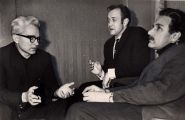
The Academic Drama Theater stages a production of Laimonis Purs' play Redzēt jūru. From the left: author Laimonis Purs, director Jūlijs Bebrišs, and actor Jānis Kubilis.
Museum of Literature, Theater, and Music (Latvia), nr. 577013 a. Photo by D. Gedzjuns. |

The premier of Laimonis Purs' play Redzēt jūru on February 15, 1968. The story's hero Anrijs Klocēns (played by Uldis Dumpis, on the right) tells Pēteris Lapiņš (played by Jānis Kubilis), ...Faith! Latvians by nature are not religious. All kinds of faiths have always been imposed upon them by others...
Museum of Literature, Theater, and Music (Latvia), nr. 252706. Photo by D. Gedzjuns. |
The premier of Laimonis Purs' play Redzēt jūru on February 15, 1968. The story's hero Anrijs Klocēns (played by Uldis Dumpis, on the right) tells Pēteris Lapiņš (played by Jānis Kubilis), <>...Faith! Latvians by nature are not religious. All kinds of faiths have always been imposed upon them by others... |
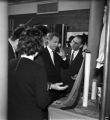
Nikolajs Beluhs (first from left), second secretary of the LCP, with participants of the LCP Central Committee's general meeting in the 1960s.
Latvia State Archive of Film, Photography and Audiovisual Documents, arh. nr. 4878 I. Photo by S. Daņilovs. |
Nikolajs Beluhs (first from left), second secretary of the LCP, with participants of the LCP Central Committee's general meeting in the 1960s. |
Nikolajs Beluhs' (second secretary of the LCP) statement at the March 26, 1968, meeting of the LCP Central Committee bureau:
...An atmosphere must be created in the party primary organizations, so that any theater productions or films that run against the party line receive the most principled evaluation from the party. That is the responsibility of all party institutions and ideological establishments. That is the responsibility of every Communist. We must provide the tone... This play [Redzēt jūru] is not only anti-Soviet. It is also glaringly nationalistic and does great harm to the friendship of nations.
|
| State Archives of Latvia PA-101- 32- 43, p. 229. |
LCP Central Committee secretary Jurijs Rubenis' statement regarding L. Purs' play Redzēt jūru at the March 26, 1968, meeting of the LCP Central Committee Bureau :
...I think we all understand quite well that these occurrences are not accidental. These occurrences are to a certain extent related to the events in Poland and Czechoslovakia. They are also the result of echoes from the Voice of America...
|
| State Archives of Latvia PA-101- 32- 43, p. 233. |

Ilmārs Īverts, member of the Latvian SSR Supreme Council and chairman of the State Radio and Television Council.
Latvia State Archive of Film, Photography and Audiovisual Documents, arh. nr. 9042-I. Photo J. Tihonovs. |
The statement by Ilmārs Īverts at the July 29, 1968, LCP Central Committee bureau meeting titled Regarding the state of contemporary Latvian soviet art literature and activities in its further development.
...I looked at the USSR Writers' Union newsletter. In it the unhealthy mood of some Moscow writers is harshly attacked. But by us things like that are ignored. We must take care to not produce writers such as Ludvik Vaculik and Jan Prochazka [Czechoslovak writers]...
State Archives of Latvia PA-101- 32 - 49, p. 155. |
| The statement by Jānis Kalnbērziņš, chairman of the Latvian SSR Supreme Council Presidium, at the March 26, 1968, meeting of the LCP Central Committee bureau : It's very characteristic that this play [Redzēt jūru] is anti-Soviet and directed against the friendship of nations and against the Russian people. It's not a coincidence. Just as in previous years, it is connected to what is happening beyond the borders of the USSR. Events beyond our borders influence the most unstable authors and playwrights... The play was performed 9-10 times and performances will continue. Each performance ends in a demonstration in the theater. All we need is for a demonstration to spill out onto the streets...
|
| State Archives of Latvia PA-101-32- 43, pp. 229 230. |
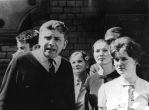
Gunārs Priede, a playwright whose play Smaržo sēnes (The Sweet Smell of Mushrooms) (1967) became the only play to be banned in Soviet Latvia.
Museum of Literature, Theater, and Music (Latvia), nr. 341638. |
Gunārs Priede leads students from the Department of History and Philology at the State University of Latvia on an excursion through Riga in autumn 1968. |
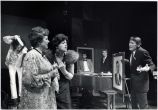
A scene from Gunārs Priede's play Smaržo sēnes at the Latvian SSR State Youth Theater. The play portrays the disparity between Soviet ideals and reality, and was eventually banned until 1988.
Museum of Literature, Theater, and Music (Latvia) nr. 584581. |
A scene from Gunārs Priede's play Smaržo sēnes at the Latvian SSR State Youth Theater. The play portrays the disparity between Soviet ideals and reality, and was eventually banned until 1988.
|
| A statement by Longins Avdjukēvičs, the chairman of the LSSR KGB, about Gunārs Priede and his play Smaržo sēnes at the March 26, 1968, meeting of the LCP Central Committee Politburo: Regarding the Latvian SSR Ministry of Culture's deficiencies in theater repertoire development:
...He has strayed from the correct track, as is said here. Why? He has produced acceptable works before. But he has changed from an acceptable playwright into a person who places his works in opposition to our reality. We should investigate. Priede does not hear what we say. Many hostile-minded people are beginning to congregate around him.
|
| State Archives of Latvia PA-101-32- 43, p. 215. |

A scene from the Riga Motion Pictures Studio film Četri balti krekli (Four white shirts) (1967), based on Gunārs Priede's play Trīspadsmitā (The Thirteenth). The play deals with rebellious youths protesting censorship.
Museum of Literature, Theater, and Music (Latvia), nr. 500389. |
A scene from the Riga Motion Pictures Studio film Četri balti krekli (Four white shirts) (1967), based on Gunārs Priede's play Trīspadsmitā (The Thirteenth). The play deals with rebellious youths protesting censorship. |
| A statement by Pēteris Strautmanis, the vice-chairman of the Latvian SSR Council of Ministers, regarding the film Četri balti krekli at the March 26, 1968, meeting of the LCP Central Committee Bureau:
...Look at this Četri balti krekli. The idea here is the same. To use creative work to escape from state control. To show that the comrades sitting up there and in control are all a bunch of fools. We are not against criticizing fools, if there are fools in key organizations... But one cannot criticize the entire foundation of the Soviet state. Then it becomes just terrible...
|
| State Archives of Latvia 101-32-43, p. 225. |
|

The informative report by Edmunds Ratnieks (chairman of the Latvian SSR Supreme Council Tourism Board) to LCP Central Committee secretary Aleksandrs Drīzulis and vice-chairman of the Latvian SSR Supreme Council Viktors Krūmiņš about the arrival in Riga of Czechoslovak tourists in 1970. The report describes the anti-Soviet mood of individual tourist groups as well as anti-Soviet comments and provocative questions posed to tour guides. One of the tour groups spent evenings by the Freedom Monument, where Ilya Rips set himself on fire in 1969, stating that we have a club of our own at this site of self-immolation. The report also states that the Tourist Board will strictly control Czechoslovak tourist groups.
State Archives of Latvia, 270-1c- 2034, pp.67 73. |
The informative report by Edmunds Ratnieks (chairman of the Latvian SSR Supreme Council Tourism Board) to LCP Central Committee secretary Aleksandrs Drīzulis and vice-chairman of the Latvian SSR Supreme Council Viktors Krūmiņš about the arrival in Riga of Czechoslovak tourists in 1970. The report describes the anti-Soviet mood of individual tourist groups as well as anti-Soviet comments and provocative questions posed to tour guides. One of the tour groups spent evenings by the Freedom Monument, where Ilya Rips set himself on fire in 1969, stating that we have a club of our own at this site of self-immolation. The report also states that the Tourist Board will strictly control Czechoslovak tourist groups.
|

A group of Czechoslovak tourists at the Riga Railway Station in the 1960s.
Latvia State Archive of Film, Photography and Audiovisual Documents, arh. nr. 15943N. Photo by N. Šiklovs. |
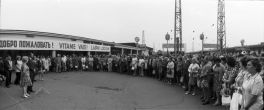
A festive welcome at the Riga Railway Station for participants of a Czechoslovak and USSR friendship tour.
Latvia State Archive of Film, Photography and Audiovisual Documents, arh. nr. 73810. |
A festive welcome at the Riga Railway Station for participants of a Czechoslovak and USSR friendship tour. |
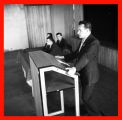
Jānis Vagris, the first secretary of the LCP Liepāja committee.
Latvia State Archive of Film, Photography and Audiovisual Documents, arh. nr. 5957 I. Photo by V. Ēvaldsons. |
An excerpt from the transcript of the 9th general meeting of the LCP Central Committee on November 26, 1968, titled Regarding the foreign policy activities of the CPSU Central Committee Politburo.
At the meeting Jānis Vagris, first secretary of the Liepāja party committee, spoke about how socialism was being threatened with the onset of an internal counter-revolution in Czechoslovakia. Also, the leaders of the Czechoslovak party and state were not able to cope with the current situation and the assistance provided by the USSR military was correct and well timed.
State Archives of Latvia PA-101- 32- 6, p. 101. |
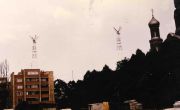
Towers set up on a Soviet military base for scrambling radio broadcasts.
State Archives of Latvia 2197- 1-v- 31, p.3. |
Towers set up on a Soviet military base for scrambling radio broadcasts. |
|
|
